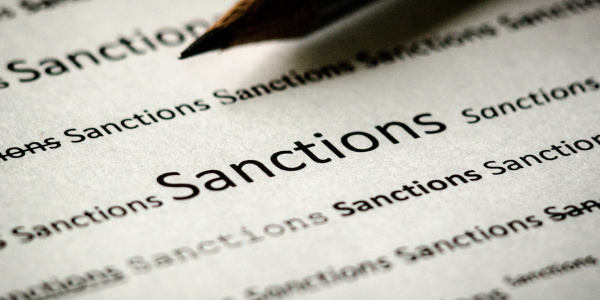BY:
SHARE:

The imposition of sanctions is a powerful tool governments use to exert economic and political pressure on specific countries or entities. However, these measures can be subject to circumvention, where prohibited goods enter the target country through various illicit means.
Circumvention undermines the effectiveness of sanctions and poses significant challenges to international efforts to promote peace and security. In this article, we will explore the different types of circumvention and the crucial role of businesses in performing due diligence to ensure compliance with sanctions regulations.
Different Types of Circumvention
Third Country Supply
Circumvention through third-country supply involves increasing trade between a third country and the target country, in this case, Russia, for UK-sanctioned goods. By exploiting trade channels with countries not subject to sanctions, illicit parties attempt to bypass restrictions and continue supplying sanctioned goods.
Re-export
In the re-export method, UK-sanctioned goods are diverted to Russia through a third country. This deceptive practice contravenes UK Measures, especially when "for use in" clauses are involved in transhipment agreements.
Cannibalisation/Transformation
In this method, UK-sanctioned goods are sent to third countries, either disassembled into components and exported to a sanctioned country or used as parts in other products subsequently exported to that country. The legality of this practice hinges on the intent or knowledge of the exporter.
Fraud/Error
Fraud or misdeclaration of customs forms is a tactic used to alter the origin or content of shipments, allowing sanctioned goods to reach their intended destination.
Lost in Transit
This circumvention occurs when UK goods under sanctions intended for a third country, remain in the sanctioned country during transit, evading sanctions restrictions.
How can my business remain compliant?
1. Understand Trade Measures
Businesses engaged in international trade must thoroughly comprehend the trade measures imposed by the UK and other countries they interact with. This includes awareness of the specific goods subject to sanctions and the relevant export control regulations.
2. Vigilance in Exporting Restricted Goods
Businesses dealing in "Restricted Goods," including Dual-Use, Critical, Industry, Advanced Tech, and Quantum items, must exercise heightened vigilance to ensure compliance with export controls. Due diligence is essential in preventing these items from diverting to unauthorised destinations. restrictions on trade go beyond Military and Dual Use goods. There is now, more than ever before, a wider range of goods that are restricted in certain circumstances. Always check the commodity code of the goods on the UK Trade Tariff to ascertain the restrictions and remember that the country controls can apply to end use and ultimate end use.
3. Due Diligence on End Use of Critical Goods
When exporting to neighbouring countries, businesses should perform due diligence to verify the end use of critical goods. This step helps prevent the inadvertent supply of sanctioned items to countries or entities involved in activities that undermine international peace and security.
4. Performing Due Diligence as an Exporter
To fulfil their obligations, exporters can take several measures, such as:
- Conducting background checks on potential buyers and partners to ensure they have no links to sanctioned entities.
- Seeking guidance from government agencies and international trade associations on conducting thorough due diligence.
- Keeping abreast of changing regulations and staying informed about potential risks related to their export destinations.
- Adopting robust compliance procedures and internal controls to minimise the risk of circumvention.
Circumvention of sanctions is a serious concern that demands collective efforts from governments, businesses, and international organisations to combat. By exercising vigilance and adhering to sanctions regulations, companies can contribute to the success of international sanctions and uphold their responsibility as responsible exporters.
If you are interested in exploring this topic further, you might find it worthwhile to consider the training courses and live clinics offered by Strong & Herd LLP:
Focus On: Embargoes, Sanctions and End-Use Controls
Join us for an in-depth exploration of Embargoes, Sanctions, and End-Use Controls in this comprehensive training course. Utilising the UK regulations as our primary guide, we will delve into the evolving sanctions landscape on Russia and the current financial sanctions enforced by OFSI (Office of Financial Sanctions Implementation).
OneCall™ Email assistance as and when required; A one-call solution for all your import, export and customs enquiries. Export help. Import help. Customs help.
Stay informed about customs and international trade matters by subscribing to our OneCall™ service. This comprehensive offering includes a dedicated email helpline for support, timely practical updates direct to your inbox (Did You Know?), monthly UK Customs & Trade Briefings and access to an interactive members' area with an exclusive community for our subscribers.
International Trade Updates & Spotlight Newsletter
Subscribe to our free information emails covering international trade topics...
MORE INDUSTRY INSIGHTS...









